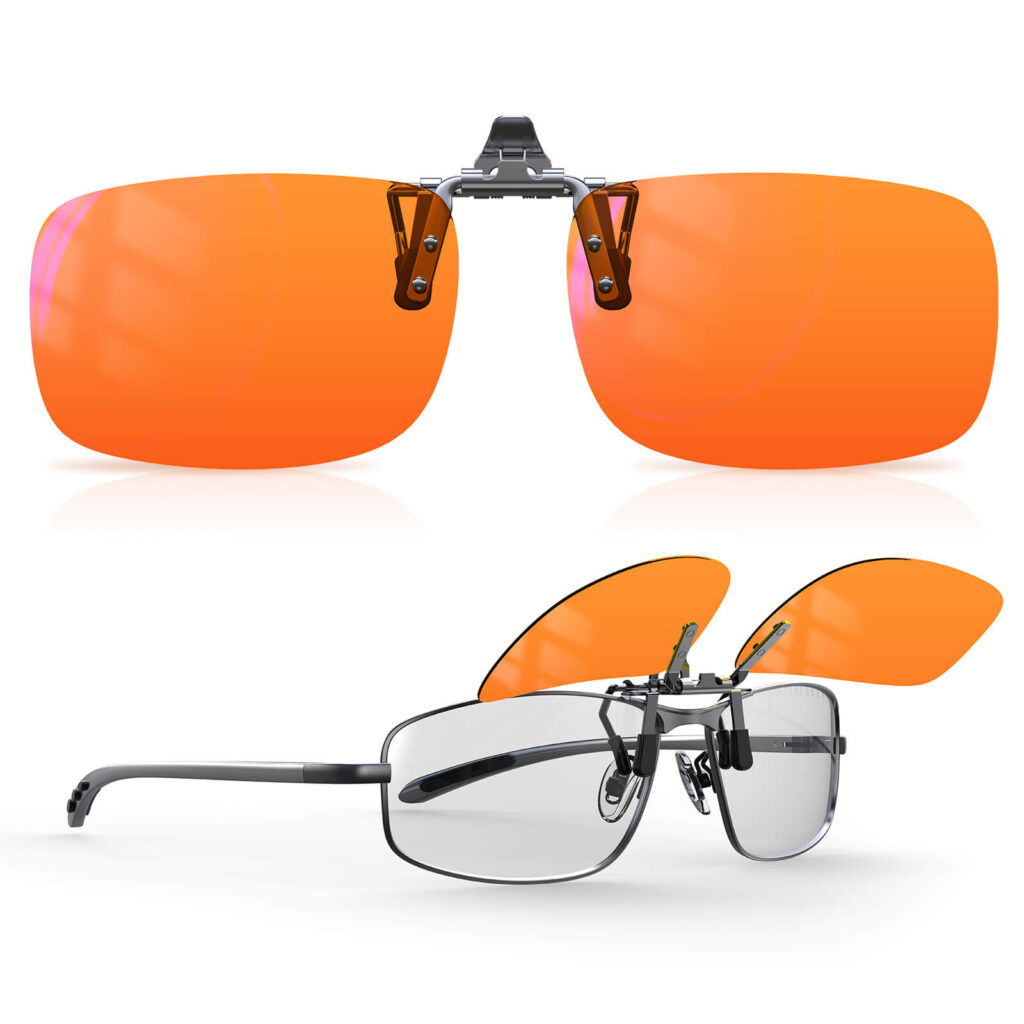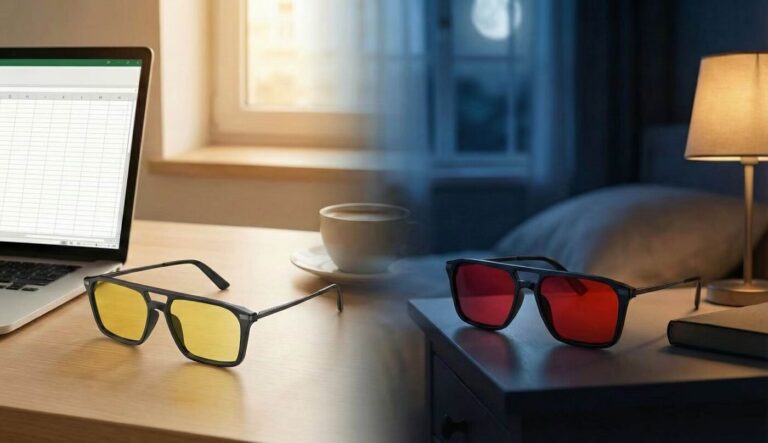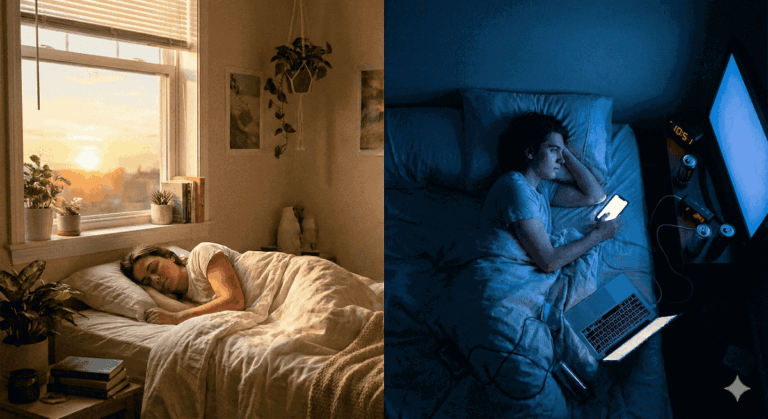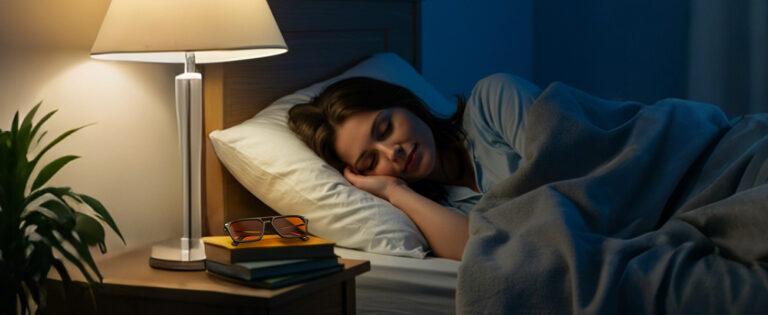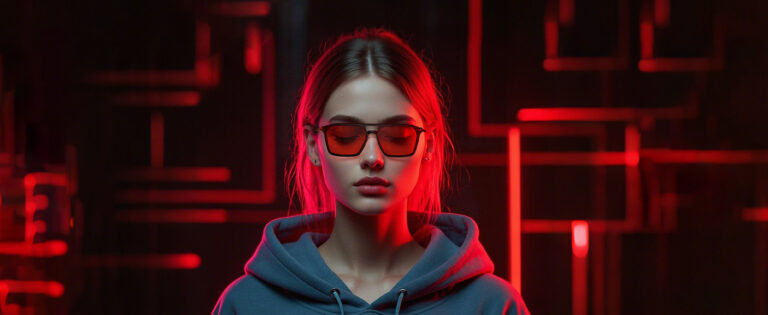Free UK/DE/FR/IT/ES/US Shipping, Other Countries (Free on Orders Over £50) SHOP NOW
Many people are confused about blue light blocking glasses due to prevalent myths and misconceptions. Do they really eliminate all blue light? Are they just like regular glasses with a coating? Understanding these myths is key to choosing the right pair for you. In this guide, we’ll unravel these common confusions, dispel the myths, and offer practical tips to help you find the perfect blue light blocking glasses tailored to your needs.
Potential Risks of Blue Light Exposure
Prolonged exposure to blue light can lead to digital eye strain, which manifests as symptoms like dry eyes, blurred vision, and headaches. Research suggests that blue light might also contribute to retinal damage and increase the risk of age-related macular degeneration (AMD) over time. Additionally, blue light exposure, especially in the evening, can interfere with melatonin production, making it harder to fall asleep and disrupting sleep patterns.
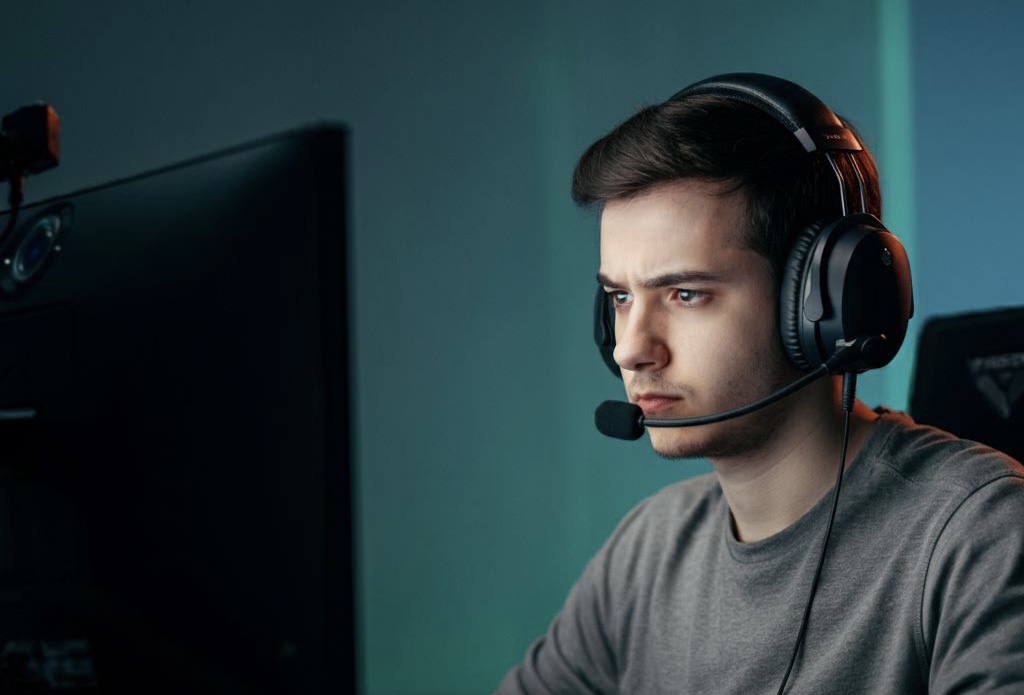
How Blue Light Blocking Glasses Work
Technology Behind Blue Light Filters
Blue light blocking glasses work by using special coatings or lenses that absorb or block blue light. Some glasses use a yellow-tinted coating that selectively filters blue light, reducing its intensity and glare. Others incorporate blue light blocking technology directly into the lens material. This technology can vary in effectiveness, so understanding the specific filtering mechanism of your glasses is essential for optimal protection.
Differences Between Blue Light Coatings and Lenses
Blue light coatings are applied to the surface of regular lenses and can sometimes be less effective than lenses specifically designed to block blue light. Lenses with integrated blue light blocking technology are designed to absorb blue light throughout the entire lens, providing more consistent and reliable protection. When choosing glasses, it’s crucial to consider these differences to ensure you’re getting the level of protection you need.
Common Misconceptions About Blue Light Blocking Glasses
When it comes to blue light blocking glasses, there’s a lot of misinformation floating around. Let’s address some of the most common misconceptions to clear up any confusion and help you make an informed decision.
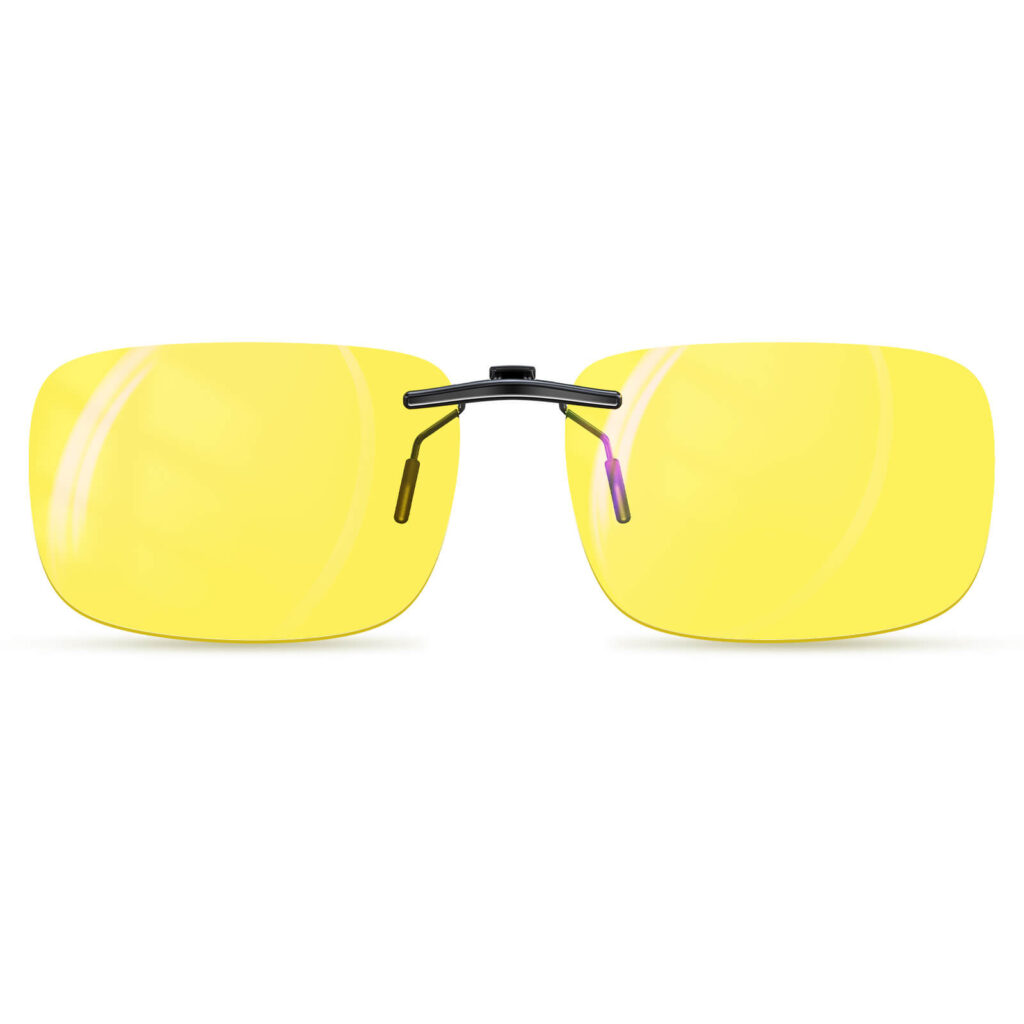
Blue Light Blocking Glasses vs. Regular Glasses
One prevalent myth is that regular glasses can provide the same protection against blue light as specialized blue light blocking glasses. While it’s true that some regular glasses may come with coatings that offer minimal blue light filtration, they aren’t specifically designed to tackle blue light exposure.
Regular glasses are primarily focused on vision correction—whether it’s for nearsightedness, farsightedness, or astigmatism. Blue light blocking glasses, on the other hand, have a dedicated coating or filter designed to absorb or block a higher percentage of blue light. This specialized function means they offer a more targeted approach to mitigating the effects of prolonged screen use.
Think of it like using a sunscreen with SPF 15 versus SPF 50. Both offer some level of protection, but the SPF 50 provides more comprehensive coverage. Similarly, blue light blocking glasses are designed to provide more effective protection compared to standard eyewear.
Do They Completely Block All Blue Light?
Another common misconception is that blue light blocking glasses completely eliminate all blue light. In reality, most blue light blocking glasses are designed to filter out a portion of blue light, not to block it entirely.
The goal of blue light blocking glasses is not to eliminate blue light completely but to reduce it to a level that is less likely to cause eye strain and disrupt your sleep patterns. Blue light is a natural part of our environment and can have beneficial effects, such as enhancing alertness and cognitive function during the day. By filtering out a percentage of blue light, these glasses help to balance exposure without removing it entirely, ensuring you still benefit from its positive effects.
Imagine blue light like a high volume of music: it’s not about turning the music off but about reducing the volume to a comfortable level.
However, a good pair of blue light blocking glasses or clip-on lenses can filter out most of the blue light. The effectiveness depends on the quality of the blue light blocking clip-on. You can determine this by checking if the glasses have proper certifications, such as with our blue light blocking clip-on lenses.
Myths About Blue Light and Eye Health
There’s also some misunderstanding about how blue light affects eye health. Some people believe that blue light is harmful in all circumstances, while others think that it’s harmless.
While excessive blue light exposure can contribute to digital eye strain and potentially increase the risk of certain eye conditions over time, it’s not inherently harmful in moderate amounts. Blue light blocking glasses are a tool to help manage exposure, especially in contexts where blue light is more intense, like extended screen use or artificial lighting in the evening.
However, it’s important to remember that blue light is not the sole factor in eye health issues. A comprehensive approach to eye care includes regular eye exams, proper lighting, and taking breaks from screens. Blue light blocking glasses are one part of this broader strategy, not a standalone solution. Think of blue light like a loud noise in a crowded room: it can be overwhelming if it’s constant, but occasional exposure in a well-managed environment is typically not harmful.
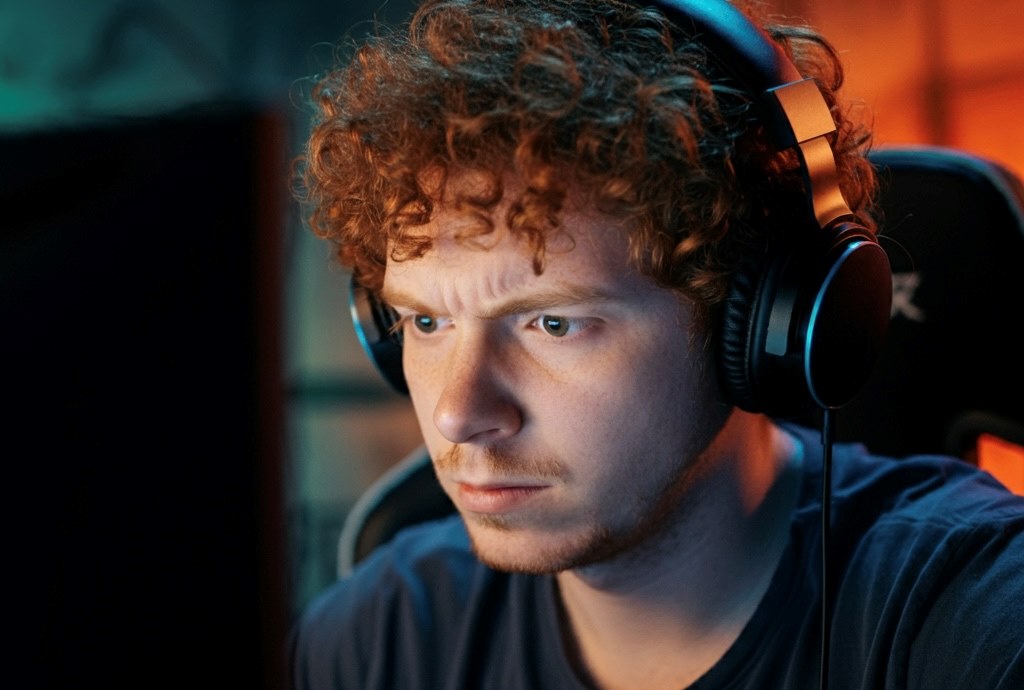
Choose Blue Light Blocking Glasses for Your Needs
Selecting the right blue light blocking glasses involves careful consideration of various factors to ensure you get the best protection and comfort. Here’s a detailed guide to help you choose the perfect pair:
Identify Your Main Goal
Assess Your Screen Time: Use built-in screen time tracking on your phone (like Screen Time on iOS or Digital Wellbeing on Android) to monitor how many hours you spend on devices each day. Note if you’re using screens for work, leisure, or both. This will help you determine how much blue light exposure you’re getting.
Evaluate Your Sleep Patterns: Apps like Sleep Cycle or Fitbit can provide insights into your sleep quality and how it might be affected by screen time.
Monitor Evening Routines: Keep a diary of your evening screen use and sleep quality to see if reducing blue light exposure improves your sleep.
Check How Well They Block Blue Light
Look for Detailed Specifications
Percentage Blocked: Opt for glasses that block at least 30% of blue light. High-quality glasses can block up to 50% or more. Check for clear information on the packaging or product details.
Wavelength Coverage: Verify that the glasses cover the blue light spectrum from 400 to 450 nm. This range is crucial for effective blue light filtration.
Choose the Right Lens Material
Plastic (CR-39): Ideal for casual use. Lightweight and cost-effective, but consider adding a scratch-resistant coating. Polycarbonate: Best for active lifestyles or for children due to its impact resistance. It’s also a good option if you’re prone to dropping your glasses.
Glass: Choose if you want the best optical clarity and durability. Look for lightweight glass options to avoid discomfort.
Look for Extra Features
Check Coatings: Anti-Glare Coating: This is crucial if you’re frequently in environments with strong lighting or reflections. It helps reduce glare from screens and overhead lights.
Anti-Reflective Coating: Enhances visual clarity and reduces distractions from lens reflections. This is particularly useful for working on bright screens.
Test Protection Levels: Some blue light glasses also block UV rays. If you spend time outdoors, ensure the glasses offer UV protection to shield your eyes from harmful rays. Look for glasses that also offer features like scratch resistance, water resistance, or blue light filtering for specific types of screens (e.g., gaming monitors).
Pick a Comfortable Frame
Try on various frame styles to see which fits best. Pay attention to how the glasses sit on your nose and ears. Check for adjustable nose pads and flexible temples to customize the fit.
Metal frames, such as those made from titanium or stainless steel, offer durability and a sleek appearance. High-quality plastic frames are lightweight and often come in stylish designs. Consider how the frames will hold up with daily use. Frames with reinforced hinges and sturdy construction are more likely to last longer.
Conclusion
In summary, blue light blocking eyewear can help reduce eye strain and improve sleep quality, especially with extended screen use. By focusing on key factors like the amount of blue light blocked, lens quality, and additional features, you can find the right glasses for your needs. Remember, they’re part of a broader approach to eye care and comfort. With the right choice, you’ll be better equipped to handle your screen time and keep your eyes feeling good.
Frequently Asked Questions
Do blue light blocking glasses completely eliminate blue light?
Blue light blocking eyewear do not completely eliminate blue light. They reduce the amount of blue light that reaches your eyes to a level that can help alleviate eye strain and minimize sleep disruption, while still allowing some blue light to pass through.
Can blue light blocking glasses prevent eye damage?
Blue light blocking eyewear can help reduce digital eye strain and may lower the risk of long-term damage, but they are not a cure-all. Regular eye exams, proper lighting, and taking breaks from screens are also important for maintaining overall eye health.
Are there any side effects of wearing blue light blocking glasses?
Blue light blocking glasses are generally safe and well-tolerated. However, some users may experience a slight color distortion or a yellowish tint when wearing them. This is due to the coating or lens material designed to filter blue light.
How should I clean and care for my blue light blocking glasses?
To keep your glasses in good condition, use a microfiber cloth and a gentle lens cleaner to clean them. Avoid using paper towels or tissues, which can scratch the lenses. Store your glasses in a protective case when not in use to prevent damage.
Can blue light blocking glasses be used for activities other than screen time?
Blue light blocking eyewear can be useful in various settings where artificial lighting or screen use is involved. They can be worn during extended periods of computer work, gaming, or even in brightly lit environments to reduce glare and enhance visual comfort.


